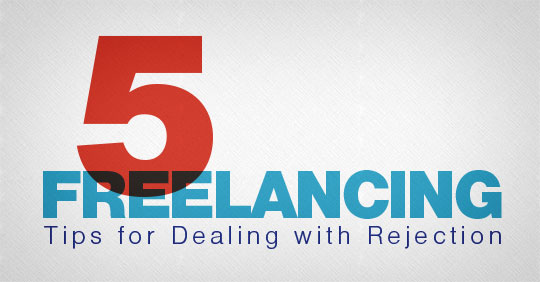
How to deal with rejection as a freelancer


As exciting as it may sound, freelancing (whatever the field) is not always the idyllic career that people believe it to be – it can be stressful and unpredictable, but it can also bring a lot of satisfaction. It is the former aspect I’m going to tackle today.
Anybody who has promised you a glamorous future, free of responsibilities and full of opportunities has set you up for a fall. Sure, there are plenty opportunities to be had, but one must learn how to take advantage of them. How is it possible for a select few freelancers to land the most amazing jobs, while others still struggle to kick-start their career? What makes a brilliant freelancer? Some might say that freelancers are more likely to take risks, while others believe that it is their resourcefulness and communication skills that separate them from the pack.

In truth, one of the traits that set them apart is their ability to constructively deal with rejection. If you are operating on a freelancing platform (for translators the most known one is probably ProZ), you have probably already had your fair share of disappointments. Certainly, having your own website, while preferable, does not guarantee you won’t face rejection. In a virtual setting, most people prefer to say ‘no’, or worse, ‘maybe’, especially when it comes to business. So what can you do to get rid of that burning sense of humiliation and injustice? Here are five sure-fire strategies that will help you deal with rejection.
1. Never Take it Personally
Rejection may be the hardest feeling to deal with, but it is also the most common. Relationships with family, friends, contractors, clients and partners present daily encounters with rejection. The fact that someone turned down your work doesn’t necessarily mean that it isn’t good. As a matter of fact, it might have absolutely nothing to do with merit or knowledge. People are very different, and they expect different things. Your idea might not resonate with theirs. Or who knows, the newly found client may be having a bad day. Or their budget is too low. There are hundreds of things that justify rejection, and most of them do not imply that your ideas are bad, nor that you are incompetent. This is why you should never take it personally. Even if you are faced with such a situation, try to learn from it. Don’t let rejection colour your career as a freelancer!
2. Don’t Stop Looking
The major difference between good freelancers and excellent ones is their ability to cope with rejection. While the former have the tendency of giving up on searches after they have been turned down a few times, the latter will persevere. By all means, take a short break and reflect on your actions. Knowing why you aren’t hired is important, but don’t stop simply because some random clients slammed the door in your face. Why are your proposals dismissed? Is a 50% rejection rate a high one? It may be, but it is also a 50% success rate if you look at the bright side.
3. Be Gracious and Kind
Have you ever considered what rejection means for the person faced with the decision? You can be sure that it is not a pleasant experience for the client/recruiter. It is very difficult to choose between candidates, especially when they are all good. Don’t make it harder for them by acting out. Be polite, maybe add them on LinkedIn or another social network and, if possible, keep in touch. You don’t know how their needs might change in the future.
4. Cultivate Relationships With your Clients
All you need is for one client to accept you. Everybody knows how one ‘yes’ canmake up for all the other rejections. The important thing now, is to ensure that the new client returns. The best advice that you will ever receive is to, as cliché as this will sound, under-promise and over-deliver. Communicate effectively, always respect your deadlines, and go the extra mile (I seem to have a preference for clichés today). Clients appreciate it when a freelancer demonstrates genuine interest in their project, and this way you will also be investing in long-term relationships.
5. Understand that Even the Best Freelancers are Rejected
Rejection may be hard, but this should not stop you from pursuing your career. Whenever you put your work out there, you will be faced with this risk. Even the greatest entrepreneurs, authors, web designers and freelancers of all time have had their ideas turned down at some point. That did not hold them back! Rejection is part of life, not part of failure, and success is what happens when you least expect it. With this in mind you can focus on your work, and apply for jobs until you get what you want.
Over to you now. Have you ever been rejected? How did you deal with it? Please share your tips.



24 Comments
Hi Alina, great tips as usual 🙂
One phrase in there really stood out for me: “take a short break and reflect on your actions”.
It’s all too easy to take rejection personally (I was bad for this when I started out as a freelancer, I think it’s a fairly natural response for a newcomer) but you soon realise that it is an inevitable part of the profession. Instead of dwelling on it, I’ve found it very helpful to take a step back and use rejection in a constructive manner when possible, learning from the experience and using it to better yourself. As you rightly say, though, you can’t please everyone – some partnerships just aren’t meant to happen. Enjoy the week!
Thank you, Joseph. It’s difficult not to take rejection personally, especially at first. You know what they say, been there, done that. Not reacting immediately (in the heat if the moment) is the best piece of advice I’ve been given and I try to pass it on – this applies not just professionally.
Thanks again for sharing your thoughts and have a great week!
I am just starting as a freelancer on oDesk. In fact, I have not received any positive answer to my cover letters… yet. Therefore, I have found it extremely useful and inspirational your blog post on perfecting yourself as a professional. Coping with rejection is not easy, but perseverance is your key to success.
Hi Carlos, thank you for your comment. I’m glad I could help in some way. Maybe you could have a look at your cover letters and see what it is that doesn’t attract replies. Maybe it’s too general? Is it relevant for each job you are applying for? Make some changes and see what happens.
Interesting post as usual and is so much relevant to the the heart of our industry. I agree that rejection is very hard, especially for a new comer to our field, but I think the positive mindset in business, and in life general, would take it as one step further in his learning curve. I am big fan of biographies, and without exception, you never find any great figure whose efforts were celebrated/accepted/or even acknowledged at the begging. I remember a story about Gerham Bell when he was trying to get funding for his project (The telephone) and some of those whom he asked for their financial support replied, ‘this is a great idea, but what is it going to be used for?’. Thanks Alina again for the inspiration.
Hi Nehad, thank you for your comment. Indeed, a positive attitude goes a long way. So does perseverance. Elvis Presley, Thomas Edison, Albert Einstein, Walt Disney are among famous people who were once rejected. You might enjoy this article: https://thoughtcatalog.com/rachel-hodin/2013/10/35-famous-people-who-were-painfully-rejected-before-making-it-big/.
Great post! The thing that helped me the most not to fear rejection was when I realized that if I offer this client my services, they could probably only reject or accept my offer and there’s always a chance, whatever size, they will say yes. If I don’t approach the client, I’m denying them the opportunity to accept my offers.
Excellent point, Yael. The first condition to succeed is to try.
How did you deal with rejection when it happened?
Being in the business for quite a few years, I don’t remember how I dealt with the first rejections. I suppose I might have even expected them. I think that the more experienced you are, the more confident you are as a professional, so it’s easier to deal with rejection. Also, with experience comes the understanding that there will be rejections, which, as you wrote, are not personal, and along them there will also be successes. It’s important to be patient and stay positive and focused on your goals.
Very interesting article! I translated it on my blog in French 🙂
https://vivrelinternational.blogspot.fr/2014/08/comment-gerer-un-refus-quand-on-est.html
Hi Romain. I’m glad you liked it and found it useful. Thanks for translating it. This way it could reach more people.
What is your experience with rejection? How have you dealt or how do you deal with it?
Like any freelancer, I am applying to many jobs, therefore I am facing rejection. But when I get my offer rejected, it doesn’t stop me for keeping on applying to other jobs.
In fact, I am applying to almost all the offers where I have the appropriate skills, it doesn’t work all the time, but if I don’t try, it will never work anyway. So just keep on applying till the right offer comes.
Thank you for the post!
I’ve been 8 years in a translation business, and now I do not take any rejections too personally. Anyway there can be different reasons for them, and it is not necessarily your fault.
Sometimes I outsource as well, and I see rude mistakes in other translators’ behavior. When you send them a rejection letter, they start talking agressively, require some explanations of rejection and sometimes even abuse. In this kind of situation a person looks very unprofessional, and I even suspect that it is very hard to improve yourself when you take every other rejection this way. You are stuck in this negative mood and do not have enough energy to grow.
Thank you for your comment, Natalia. You have summed it up very nicely. The way one deals with rejection also reflect on their image. Being rude to someone who rejected you is not the way forward. The rejection may have been temporary, but a rude attitude will chase that client away for ever.
And a negative attitude can indeed leave someone without energy. Very nicely put. Thanks again for stopping by and hope you’ll continue reading our blog and find interesting posts.
The topic sounds psychological. A shrink might help here, too))
For me the worst is not being rejected, but that fact that well-paid jobs are so unavailable yet. I had to put in lots of years in my education and self-education and being employed for what I think a low income. I felt really bitter that no matter how many projects I took on and no matter how hard I worked I just wasn’t eligible for more adequate payment.
When I had kids I had a long period of being “unattractive” to contractors. The only jobs I could land we actually for free… They helped me to build up experience.
Now I have a good rate with 1 client who is of good opinion of my work, but the project takes twice the necessary time to complete, and again, my earnings per hour are just not competitive enough for me. Despite to good rate.
I know the majority of people in our country are poor… They live with parents ’cause it’s cheaper, they cannot afford renting or mortgage.
I’m just discouraged that being independent is so hard economically. ))I should have been an IT specialist really)) They have very good terms, it’s seems to be the central market of our life now.
When I read at Proz.com that rates like 0.02 USD per word are UNACCEPTABLE, I just smirk. They are the highest ones publicly available in our country! And there’s a whole mystery how to get different ones. Profis only hint that it’s possible.
I’ve been looking for international projects and quoting 0.06 and I don’t care about rejections. I know most agencies expect much to pay less. It’s that I’m not ready to waste my time for less. Thanks to my husband I can afford to pick and choose.
))So I would appreciate a guide “How to land good-paying jobs”. Perhaps there’s already one here… Got to check.
[…]Now I have a good rate with 1 client who is of good opinion of my work, but the project takes twice the necessary time to complete, and again, my earnings per hour are just not competitive enough for me. …[…] To me , this suggest your rate is definitely too low. Educate the client, show them what the translation process entails. Most clients (I am not talking about agencies) honestly do not know (like I don’t know about plumbing, for instance) what it takes to be a professional translator or how long it takes to translate a text. But it is our duty, as professionals, to show them.
[…]When I read at Proz.com that rates like 0.02 USD per word are UNACCEPTABLE, I just smirk. They are the highest ones […] in our country[…] These ARE unacceptable rates! We work with Russian translators and trust me, not one of them charges that little.
[…]I’ve been looking for international projects and quoting 0.06 […]. I know most agencies expect much to pay less. […] No, not all agencies pay peanuts. You are probably working with the wrong ones.
I agree with Alina. If you are talking about the Russian translation market, you should stop working for domestic companies only, they rarely offer fair rates. Take it for granted. The only way to start raising more money is to cooperate with international companies. I started my way on Proz and some other similar platforms. I got my first customers there. After a while new clients started to reach me direclty because they liked my profiles, cv, testimonials, project history, etc. Nowadays there are so many online resources, blogs, social networks, where you can find all necessary information: how to start your freelance business, how to make it successful, what rates are fair, and so on. I regret that I have found all that informational wealth not a long time ago.
It’s in your hands. If you really do what you like, you’ll be able to turn the tide. Cheer up!
Natalia and Alina, thank you very much for your feedback!
Perhaps my international search wasn’t really tailored. I was aware that it’s worth going international and finding direct clients rather than agencies. Now I’ll see if there’ a cleverer way to do it than I did. Alina, I didn’t write that there are no well-paid jobs here, in the CIS countries, it’s just that the majority _are_ like that. And such salary is even high^compared to some other specialists.
Hi! I am just starting as a freelancer, translating from Asian languages. Actually, the feedback that I get from my friends and relatives is that if you wish a contract, you first need a name, But a name cannot be made without contract. Dear colleagues, do tell me how you have dealt with this Catch-22? And what to do if in this beginning to all my suggestions I get neither yes nor no (which could anyway be a possibility to find out what is going on…) but just grave silence. Thanks beforehand for your kind advice and help.
Hi Sophia, many thanks for your comment. It doesn’t have to be a Catch-22. If you have the right credentials and a good portfolio, that helps getting more and more contracts and therefore ‘a name’ if you wish. You can build your portfolio by working as a volunteer translator and ask for referrals. As for getting silence instead of a clear ‘yes’ or ‘no’, try following it up. When and if they say no, ask (if possible, of course) to let you know why. You can learn a lot from rejection actually.
This is a nice reminder. I always take rejection and feedback personally – no matter how much I tell myself not to! It’s only because I care so much about doing a great job. But it’s definitely worth remembering that the most successful people in the world have probably faced the most rejection as well! It’s all part of the learning experience. 🙂 Thanks, Alina!
Thanks for reading and commenting, Natalie. I guess it’s simply in our nature to take rejection personally, it shows that we care 🙂
I was very strict with myself at the beginning of my freelance journey. And I did a lot of unpaid work and was too afraid of what employers would think about my skills. But with time I gained more experience, became disciplined, and began to appreciate myself and my work. Being a freelancer is still not easy and of course, I still get rejections. But I try to move on and improve myself.
It’s difficult not to take it personally no matter where on your journey you are. Learning from each experience is the only way forward though.
Thanks for stopping by and for sharing your thoughts, Lilly.